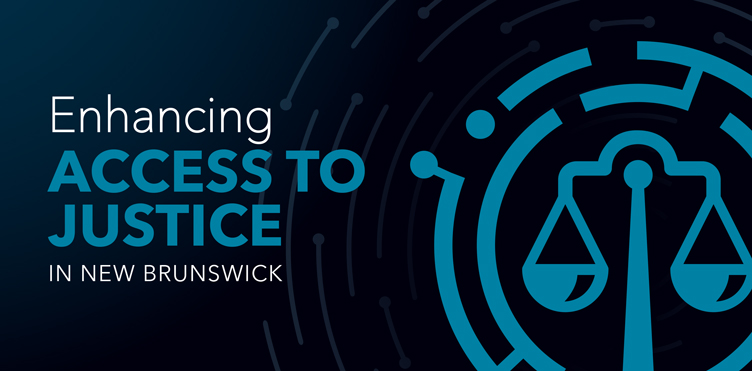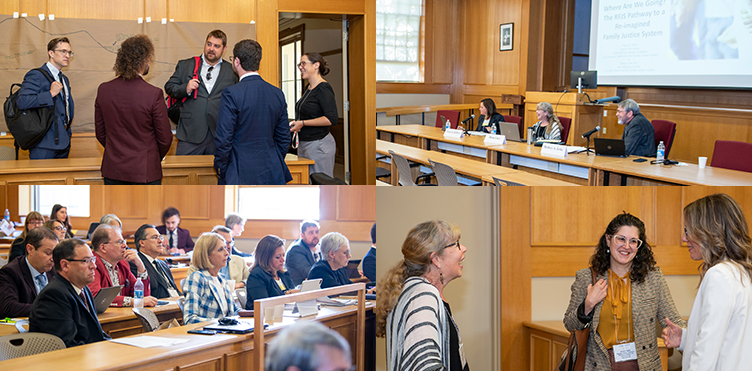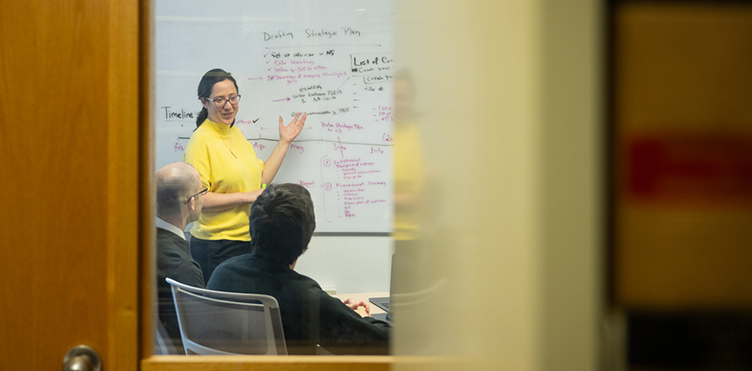
The Legal Innovation Laboratory at UNB Law is dedicated to the study of law, technology, and access to justice.
The principal aim of the Laboratory is to study participatory policy-making methods in e-justice design to enhance access to justice in New Brunswick. While mindful of unique local parameters, New Brunswick’s potential role as a Canadian microcosm and a success-story of technological leapfrogging is central to our research program’s design.
The research team focuses specifically on bilingual and multilingual communities in the Atlantic Canada region. We undertake research projects focused on the digital transformation of justice systems in New Brunswick. Our research projects explore how to resolve some of the tensions that are arising from the digitization of justice systems, such as privacy, security and accessibility.
The team also investigates legal and institutional changes in the age of AI. This includes, among others, copyright law questions, and questions on data privacy and cybersecurity. The laboratory was launched in January 2023, one month after OpenAI’s introduction of ChatGPT to the world. It was already apparent that AI applications, and specifically generative AI, have the potential to revolutionize but also disrupt the production and access to legal data, the offering and access to legal services, and in the long run possibly also entire fields of law.
The Legal Innovation Laboratory has formed collaborations with the Canada Institute for the Administration of Justice to study various aspects of access to justice barriers in the Atlantic Canada region, with the UNB Legal Clinic to build electronic legal aid tools, and with the Canadian Institute for Cybersecurity to promote the study of cybersecurity and law in Atlantic Canada. The Laboratory is funded by the Canada Research Chairs Program through Dr. Panezi’s CRC Tier-2 grant, the New Brunswick Innovation Foundation, and the Canadian Bar Association’s Law for the Future grant.

The Legal Innovation Laboratory team investigates legal and institutional changes in the age of AI. This includes, among others, questions of copyright law, risks and liabilities, as well as questions on data privacy and cybersecurity.
In January 2024, the lab team collaborated with Joshua Dickison, UNB’s Copyright Officer at UNB Libraries, and responded to the Federal Government Consultation on Copyright in the Age of Generative Artificial Intelligence on behalf of UNB Libraries.
UNB’s submission to the Consultation on Copyright in the Age of Generative Artificial Intelligence
With John O’Shea, Argyri Panezi investigates legal risks and liabilities associated with legal translation in the age of machine translation and generative AI.
Argyri Panezi’s work has focused on AI regulation and specifically on human oversight over high-risk AI systems. She has been writing about AI regulation and governance from a comparative perspective, examining legislative efforts primarily in the EU, the US, and Canada. Panezi’s work focuses on the notion of human control, the legislative bias over human instead of machine oversight, and on limitations such as the challenge of overcoming automation bias.
Article 14: Human Oversight, in The EU Artificial Intelligence (AI) Act: A Commentary
Liability Rules for AI-facilitated Wrongs: An Ecosystem Approach, in AI and the Law
Argyri Panezi’s work has explored the infrastructural role of data and questions about privacy in the AI-powered Metaverse. With her co-authors, she presented the results of her research in their paper, The Matrix of Privacy: Data Infrastructure in the AI-Powered Metaverse, recently published at the Harvard Law & Policy Review.
The Matrix of Privacy: Data Infrastructure in the AI-Powered Metaverse
The Legal Innovation Laboratory team investigates national efforts to protect critical digital infrastructures, and how systemic vulnerabilities contradict national digital sovereignty claims.
Cybersecurity and the Law - Quo vadis, Canada? (talk, October 28, 2024)
The proposed Bill C-26: A Framework to Protect Canadian Critical Infrastructures (talk, Oct. 26, 2023)
National efforts to protect critical digital infrastructures (talk, Oct. 21, 2023)
The Legal Innovation Laboratory research team investigates digital transformation processes in justice systems, with specific focus on the Atlantic Canada region and on New Brunswick’s justice system.
We engage with local stakeholders and user communities to discuss current problems and propose solutions. It is possible to use a smaller province such as New Brunswick as a microcosm of Canada because its size and demographics make it feasible to gather meaningful data and insights representative of linguistic, Indigenous, urban, and rural populations, among others. New Brunswick’s unique features generate insights that are impactful within the province, across Canada, and beyond.
We study the current state of digitization within the New Brunswick justice system. Among the laboratory’s goals are to map the objectives of NB stakeholders (policymakers, judges and other court staff, lawyers, and users of the justice system) and develop normative criteria for e-justice and assess how to best achieve those stakeholders’ future targets, in view of the province’s specific characteristics and the peoples’ needs.
The research team combines empirical studies, including interviews, surveys, and participatory observation, with legal and interdisciplinary analysis to understand how digital technologies are currently employed in NB’s justice system compared to available data about other justice systems in Atlantic Canada, Canada, and abroad.
Participants of the inaugural New Brunswick Access to Justice Summit (August 28-29, 2023) expressed the urgent need for modernization of the justice system for both short- and long-term benefits. The priorities articulated during the Summit include updating the Rules of Court to allow for systematic use of a bilingual electronic filing and case management system for all New Brunswick courts, inclusive of flexible use of videoconferencing to accommodate remote hearings when needed. Participants also called for permitting electronic signatures to facilitate the introduction of electronic filing systematically and before all courts in the province. The call was persistent and near unanimous.
While participants acknowledged that e-filing is not a universal remedy, its systematic adoption would help alleviate some significant issues with travel, which is timely and costly with the rural population of New Brunswick. Technology is available in courtrooms to hold remote hearings, but access to court records across judicial districts is challenging in the case of voluminous paper records. The Honourable Chief Justice J.C. Marc Richard pointed out that e-filing would allow cases to be shared more easily among judicial districts. If one district has capacity for a hearing, while another is overwhelmed, a digitized court filing system would allow the court record to be instantly transferred to a judge and court staff in the district with extra capacity. This could significantly reduce backlogs in the court system.
Our summary report of the 2023 Access to Justice Summit and suggestions, aiming at improving New Brunswickers’ equitable access to and communication with their courts, are available in the report below.
Digital Transformation: Putting People at the Heart of the System | The New Brunswick Access to Justice Summit, Report of the Canadian Institute for the Administration of Justice and the University of New Brunswick Legal Innovation Laboratory
La transformation numérique: placer les personnes au cœur du système | Sommet sur l’accès à la justice au Nouveau-Brunswick, Rapport de l’Institut canadien d'administration de la justice et du Laboratoire d’innovation juridique de l’Université du Nouveau-Brunswick
Access to information is a cine qua non to access to justice. Meaningful access to information about the courts and the legal system more broadly is a core right and a legitimate expectation for citizens of the current century. Courts’ websites, which act as the virtual front door and main source of information about the court system have an important role to play towards enhancing peoples’ access to justice.
Members of the Legal Innovation Lab have proposed changes to the New Brunswick Courts’ official website. Our suggestions, aiming at improving New Brunswickers’ equitable access to information about their courts and their justice system, are available in the report below.
Modernizing the New Brunswick Website: A Primer

Partnering with the Canadian Institute for the Administration of Justice, the Legal Innovation Lab organized the inaugural New Brunswick Access to Justice Summit, themed “Digital Transformation: Putting People at the Heart of the Justice System.” To our knowledge this was the first of its kind in the province.
The Summit was held at UNB Law on the 28th and 29th of August 2023, and brought together members of the judiciary, government, legal services, and civil society of New Brunswick, together with experts from other provinces, including from Québec, Alberta, and British Columbia, and the federal government.
The Summit was born out of a desire by members of the New Brunswick Justice community to understand the impacts and adjustments brought about to the justice system in response to the Covid-19 health crisis. It provided the space to brainstorm solutions to improve the delivery of justice services in New Brunswick, starting with family law needs. It launched an action-plan and longer-term research plan to be led by the UNB Law Legal Innovation Laboratory in collaboration with local stakeholders and community.
Agenda
One year after the inaugural New Brunswick Access to Justice Summit, UNB’s Legal Innovation Laboratory hosted the 2024 Access to Justice Symposium to present the New Brunswick Advisory Committee on Access to Justice. Through a series of workshops, the Symposium focused on certain items on the Committee’s agenda, including focusing on digital transformation needs and associated challenges.
The Symposium, themed “Building Innovative Strategies for Greater Access to Justice in New Brunswick”, hosted workshops and facilitated discussions on current developments in New Brunswick, including initiatives at the New Brunswick Courts and the Department of Justice, and on how to continue building innovative strategies to promote access to justice in the province. In addition, participants discussed priority lists for New Brunswick’s Access to Justice strategy, New Brunswick’s unique features and strengths but also challenges and needs.
The Symposium featured a keynote speech delivered by Dr. Igancio Cofone, Professor of Law and Regulation of AI at the University of Oxford. Dr. Cofone discussed the 40-years old Privacy Act and the challenges in the age of AI. The Symposium also featured expert talks and interventions by Rachelle Standing, Chief Legal Officer, Court of King’s Bench of New Brunswick, Hilary Young, Professor, Faculty of Law, University of New Brunswick, Aaron Unger, Director, Product Development, Cybersecurity and Digital Trust Branch, Office of the CIO, Ministry of Citizen Services, British Columbia, and Christine O’Doherty, Executive Director, Canadian Institute for the Administration of Justice.
Agenda
The New Brunswick Advisory Committee on Access to Justice (ACA2J) was revived in 2024 under the leadership of the Honourable J.C. Marc Richard, Chief Justice of New Brunswick.
The 2023 New Brunswick Access to Justice Summit and the subsequent summit report were two catalysts for the revival of the committee tasked with elaborating a coordinated approach to addressing how justice is administered and accessed in New Brunswick. The New Brunswick Advisory Committee on Access to Justice convenes all major players in the justice system for the purpose of identifying and implementing reforms to improve access to justice in New Brunswick. The Advisory Committee has established subcommittees for its initiatives, as well as for outreach to communities particularly impacted by the justice system.
According to the Committee’s Terms of Reference, adopted in June 2024, the New Brunswick Advisory Committee on Access to Justice shall:
For its works, the Advisory Committee has received support from the McLachlin Fund.
The Legal Innovation Laboratory collaborates with the UNB Legal Clinic to build an algorithmic tool and platform to assist Legal Clinic clients with filing for unconsented divorce in New Brunswick. The Laboratory’s research team works with the UNB Legal Clinic team to (a) write a decision tree algorithm that helps users decide whether and how to file for uncontested divorce in New Brunswick; (b) design and test a user-friendly bilingual (English and French) platform embedding the algorithm and linking to court registries for direct filing; (c) design and communicate to New Brunswick communities a pilot program for assistance with uncontested divorce petitions; (d) supervise a select number of Legal Clinic students who will help clients use the platform over the course of the pilot program; and (e) conduct a preliminary assessment of the pilot program.
In its first year of operation Ms. Jeannette Savoie, Director of the UNB Legal Clinic, noticed the need to assist clients with divorce claims. Legal Clinic clients who would like to petition for divorce and cannot afford to be represented by a lawyer need basic advice and assistance which they do not get from the currently commercially available web or other applications. Currently available web platforms that offer cheaper “online divorce" solutions typically ignore procedural complexities specific to the province oversimplifying or omitting legal requirements. This is mostly because they use tools designed usually outside of Canada and without the knowledge of substantive or procedural laws of the province - for instance the currently available web platforms possibly serving New Brunswickers are US based. More sophisticated legal software solutions are available commercially; however, these are directed at lawyers and law firms, and not individual clients.
The project leads, Dr. Panezi, Director of the Legal Innovation Laboratory at UNB Law, Ms. Savoie, Director of the UNB Legal Clinic, and Mr. Jacob van der Laan, member of the UNB Faculty of Computer Science and former Director and Chief Information Officer at the NB Financial and Consumer Services Commission, formed a working group with members of the Court of King’s Bench appointed by the Honourable Tracey K. DeWare Chief Justice of the Court of King's Bench of New Brunswick to participate in the working group.
This tool and platform are currently being designed to be used directly by clients, first under a pilot program, free-of-charge, within the Legal Clinic and with the guidance of the Legal Clinic staff. The project is supported by the Canadian Bar Association Law for the Future Fund.
Article 14: Human Oversight, in The EU Artificial Intelligence (AI) Act: A Commentary (commentary)
UNB’s submission to the Consultation on Copyright in the Age of Generative Artificial Intelligence. (consultation submission)
How can we manage the risks and liabilities associated with legal translation in the age of machine translation and generative AI? (working paper)
The Matrix of Privacy: Data Infrastructure in the AI-Powered Metaverse (paper)
Liability Rules for AI-facilitated Wrongs: An Ecosystem Approach, in AI and the Law (paper)
Cybersecurity and the Law - Quo vadis, Canada? (talk)
The proposed Bill C-26: A Framework to Protect Canadian Critical Infrastructures (talk)
National efforts to protect critical digital infrastructures (talk)
Digital Transformation: Putting People at the Heart of the System | The New Brunswick Access to Justice Summit, Report of the Canadian Institute for the Administration of Justice and the University of New Brunswick Legal Innovation Laboratory
La transformation numérique: placer les personnes au cœur du système | Sommet sur l’accès à la justice au Nouveau-Brunswick, Rapport de l’Institut canadien d'administration de la justice et du Laboratoire d’innovation juridique de l’Université du Nouveau-Brunswick
Modernizing the New Brunswick Website: A Primer

As part of the law school curriculum, Dr. Panezi teaches courses on law and technology focusing on topics relevant to the research at the Legal Innovation Laboratory.
The Technology Law and Policy course offers students an introduction to the broader field of law and technology, focusing specifically on digital technologies, and a survey of contemporary legal topics which include telecommunications regulation and Internet governance, the regulation of AI, and the Internet of Things (IoT).
The course is structured in two parts. The first part focuses on both case-law and theory tracing the original debates in the field, and looking primarily at online speech, privacy, and copyright as well as questions of jurisdiction. The second part of the course focuses on current legal debates in Canada and globally specifically covering:
The final session of the class will provide an overview of rising debates on Web 3.0 and Quantum technology.
Along with the many promises, our increasingly digitized world comes with ever-growing security risks. Can law and policy help us manage the risks?
Leaks of consumer data, disinformation, cyber-espionage campaigns conducted by private companies and intelligence agencies, malware targets etc., all raise common questions at the intersection of law and cybersecurity.
The seminar examines these questions aiming to provide a comprehensive view of the current cybersecurity challenges and how they intersect with law. It introduces cybersecurity as a global risk and focus on challenges related to public and private law aspects of cyber regulation, at a national, regional, and international level.
In this seminar students get the chance to read national security strategies, focusing specifically on the Canadian strategy and legislative framework (the recently proposed Critical Cyber Systems Protection Act in Bill C-26), and study current topics which include the battle against mis- and disinformation, surveillance, cyber-terrorism and the dark web, and cyber-insurance policy.
The seminar also covers select topics at the intersection of cybersecurity and international law touching upon intelligence, cyber-espionage, and cyber-operations. The class periodically features guest speakers, scholars and practitioners, experts in certain topics covered.
Agenda [EN][FR]
Graham J. Reynolds, Associate Professor and Associate Dean, Research and International, Peter A. Allard School of Law, University of British Columbia, Revisiting the Role of Courts in Helping Individuals Realize their s. 2(b) Right to Information About Court Proceedings
Michelle Thompson, Executive Director, PLEIS-NB, New Brunswickers’ access to court and legal information
Argyri Panezi, Assistant Professor and Director of the Legal Innovation Laboratory, Faculty of Law, University of New Brunswick, and Kyle Cullen, JD Candidate and Research Assistant at the Legal Innovation Laboratory, Faculty of Law, University of New Brunswick, Enhancing the New Brunswick Courts’ Website
David Matyas, Assistant Professor, Faculty of Law, University of New Brunswick, Openness, improved planning, reflexive decision-making, and systematized learning for future-proof courts

Dr. Panezi joined UNB Faculty of Law in 2023, after being awarded the Canada Research Chair in Digital Information Law and Policy (Tier 2). She holds a law degree from the University of Athens, an LL.M. from Harvard Law School and a Ph.D. from the European University Institute.
Dr. Panezi’s research at UNB is funded by the Canada Research Chairs program, the New Brunswick Innovation Foundations, and the Canadian Bar Association. Prior to that she conducted research at the European University Institute, UC Berkeley School of Law, NYU School of Law, Stanford University, and at IE Law School, and has been funded by several prestigious institutions including Stanford University, the Ford Foundation, the Onassis Foundation and the Greek State Scholarships’ Foundation.

Kyle is a third-year law student at UNB. His current research interests surround the concept of digital sovereignty, such as interjurisdictional data flows, cyber-exceptionalism and data localization policies. He is currently exploring the legal consequences of social media bans.
Prior to commencing law school Kyle worked in finance and operations management roles for a large online retailer and in the public healthcare system. His experience includes designing, formalizing, and implementing administrative processes within the constraints of information management systems.
Kyle holds a Bachelor of Commerce (Major in Accountancy) from Concordia University and an MBA (Major in Finance) from McMaster University.

Jacob Powning is a third-year law student interested in public law and the relationship between law and new technology. Jacob plans to work in public prosecution in the future and hopes to continue researching the intersection between AI and the law.
Before attending Law School Jacob worked as an artist craftsman. His work included research at the British Museum.
Jacob has a BA in Philosophy and Master’s in Interdisciplinary Studies (M IDST) in Philosophy, History, and Literature. He was awarded the Lieutenant Governor’s silver metal after his BA, and he completed his Master’s research with funding from Social Science and Humanities Research Council. He holds a Lord Beaverbrook Scholarship in Law.
Laura Rourke is a third-year student at UNB faculty of law, with a special interest in intellectual property, technology law with a focus on AI, and human rights law. She hopes to delve deeper into research on the impact of AI on individual rights and the intersection of AI and copyright law.
Laura has worked with Pro Bono Students Canada and the Canadian Civil Liberties Association, where she wrote a submission for the Government of Canada’s Consultation on ‘Copyright in the Age of Generative Artificial Intelligence’ (September-December 2023). She is currently researching questions about AI regulation in Canada and around the globe.
Laura holds an Honours BA in Law and Society with a Professional Certificate in Public Administration and Law from York University.

Amin Tabrizchi is a third-year student at UNB Law with an interest in both corporate and tax law. He is also interested in the intersection of Generative AI and tax research.
Amin was born and raised in St. John's, Newfoundland. He attended Memorial University, where he completed his Bachelor of Science, majoring in both Applied Mathematics and Economics.
Amin is currently a summer student with McInnes Cooper and plans to return to the firm upon graduation to complete his articles. During his free time, Amin enjoys boxing and spending time watching football with his family.
Caitlin Grogan is a third-year law student in the UNB Faculty of Law. She is interested in how new technologies can improve access to justice in New Brunswick. Throughout her time at UNB Law, she has been involved in Pro Bono Students Canada and is currently one of the PBSC volunteers with the lab.
Caitlin holds a Bachelor of Arts with first class honours in sociology.
Catherine Oss is a first-year student at the University of New Brunswick Faculty of Law, with an interest in access to justice initiatives. She takes part in the Legal Research and Innovation Lab through Pro Bono Students Canada, an organization committed to offering free legal support to individuals and communities facing barriers to justice. Catherine holds a Bachelor of Arts from Dalhousie University, where she majored in Political Science.
Michelle Westerkamp is a first-year student at UNB law. She is interested in the access to justice crisis and the ways in which we can make legal information more accessible for everyone.
Michelle has a BA in English Literature from the University of Prince Edward Island and Master of Information with a certificate in Data Management from Dalhousie University.
Lauren Whalen is a first-year student at the University of New Brunswick Faculty of Law, with an interest in criminal law and access to justice initiatives. She is involved with the Legal Research and Innovation Lab through Pro Bono Students Canada, an organization dedicated to providing free legal support to individuals and communities facing barriers to justice. Lauren holds a Bachelor of Commerce from Saint Mary's University, where she majored in both Finance and Marketing.
Jeannette Savoie is the Director of the UNB Legal Clinic. She brings over 20 years of practice experience to the position, including ten years with the Legal Aid Commission of the Northwest Territories. Ms. Savoie believes strongly in promoting access to justice through actions rather than words. During her time in the north, she established and operated the Outreach Legal Aid Clinic, which provides free legal representation to low-income people in matters relating to housing, disability and pension-related matters, employment issues, mental health and guardianship reviews, child protection matters, and debtor, creditor or civil claims.
Since joining the UNB Legal Clinic in 2022, Ms. Savoie has worked tirelessly to expand the scope and mandate of the clinic, establishing mobile clinic services in communities across the province.
Jacob van der Laan is an Assistant Teaching Professor in the Faculty of Computer Science at the University of New Brunswick, where he teaches data mining, professional practice, and cybersecurity risk management, among several other courses. Prof. van der Laan regularly give talks on cybersecurity and artificial intelligence related topics.
Prof. van der Laan is a contributing author to the International Handbook of Blockchain Law, now in its second edition, as well as the International Handbook of AI Law, both published by Wolters Kluwer.
From 2014 to 2023, he was the Chief Information Officer at the New Brunswick Financial and Consumer Services Commission, and prior thereto its Director of Enforcement for 12 years. Prof. van der Laan spent the first 12 years of his career as a trial lawyer in private practice.
The Honourable Marc Richard, Chief Justice of New Brunswick discusses the benefits of digital transformation to the New Brunswick justice system. Interviewed by Jacob Powning, Researcher | UNB Law, Legal Innovation Laboratory
The Honourable Tracey K. Deware, Chief Justice of the New Brunswick Court of King’s Bench discusses the efforts taken to implement a digital transformation in New Brunswick’s justice system. Interviewed by Kyle Cullen, Researcher | UNB Law, Legal Innovation Laboratory
Christine O'Doherty, Executive Director CIAJ discusses how the UNB Access to Justice Summit was initiated. Interviewed by Argyri Panezi, Canada Research Chair | UNB Law, UNB Legal Innovation Laboratory
Dr. Ignacio Cofone, Professor of Law and Regulation of AI, University of Oxford. Access to Justice Symposium at UNB Law - Building Innovation Strategies for Greater Access to Justice in New Brunswick. Interviewed by Argyri Panezi, Canada Research Chair | UNB Law, UNB Legal Innovation Laboratory
Dr. Emily Taylor Poppe, Professor of Law, UC Irvine School of Law, presents her recent paper, Court as Data Guardians for the Public Good (University of Toronto Law Journal 73.Supplement 1 (2023): 34-58) | February 28, 2025 | UNB Legal Innovation Laboratory.
Professor Heather Heavin, Associate Dean Academic at the College of Law of the University of Saskatchewan presents: Towards a Justice Data Common: Improving Data Collection, Analysis and Sharing in Saskatchewan’s Justice Sector | March 28, 2025 | UNB Legal Innovation Laboratory.
Professor Amy Salyzyn (University of Ottawa, Faculty of Law) and Professor Jacquelyn Burkell (University of Western Ontario, Faculty of Information and Media Studies) discuss their recent study: "Court Form Accessibility: Adopting, Designing, and Evaluating Online Guided Pathways" | April 25, 2025 | UNB Legal Innovation Laboratory.
UNB Professor and Director of DataNB (formerly NB-IRDT) Ted McDonald argues that the principle of ‘Collect Once, Use Many Times’ should be central to the design or redesign of data systems and highlights the great potential of doing so with justice data in NB, including the importance of making justice data FAIR (findable, accessible, interoperable, reusable). | May 30, 2025 | UNB Legal Innovation Laboratory.
If you want to know more about our projects, give us your feedback, participate, or just connect, please email argyri.panezi@unb.ca.
